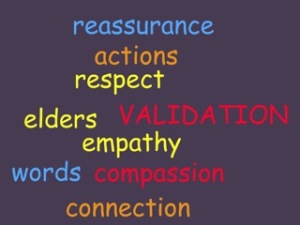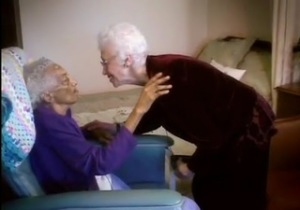 Guest article by Judith Henry
Guest article by Judith Henry
All of us have lived through times when the universe throws so much our way, so quickly, that we become upset, anxious, and overwhelmed.
Suddenly, everything looks brighter, when a friend, family member, or even a stranger, comes forward to provide reassurance that our thoughts and emotions are recognized and understood.
This feeling of being heard and accepted is known as validation, and it is a basic human need, regardless of age and condition.
Yet for the very old, with dementia or other cognitive disorders, this positive experience is far less likely to occur. Because the world is often frightening and confusing to them, some react with bizarre behaviors while others turn inward. This creates a wall of isolation that is difficult to breach, even by the most conscientious of caregivers.
 Enter, Naomi Feil, MSW. Years ago, unhappy with the traditional methods for working with elderly, disoriented individuals, she designed a method of therapeutic communication known as Validation Therapy.
Enter, Naomi Feil, MSW. Years ago, unhappy with the traditional methods for working with elderly, disoriented individuals, she designed a method of therapeutic communication known as Validation Therapy.
Naomi’s technique, Validation, incorporates verbal and nonverbal ways of connecting with patients using empathy and respect to build trust and effect change.
Since Naomi believes that many people, during the final stage of life, are struggling to come to grips with the past, this technique can provide both relief and closure.
Now being used worldwide, Validation has found success, in part, because it can be learned and implemented by professionals and lay people alike, with results that are sometimes life-changing for everyone involved.
Some of the benefits to elders include:
- An increase in communication, both verbal and nonverbal
- Less anxiety and agitation
- Less need to withdraw from what is going on around them.
- Deterioration, in general, may be slowed down
Just as important are the ways in which caregivers’ lives are improved:
- Burnout is lessened
- Stress is reduced
- Increased capability in handling difficult behaviors
- Greater job satisfaction
If you want to be inspired by an example of Validation Therapy in action, click to view Naomi Feil’s video as she reaches out to Gladys Wilson, diagnosed with Alzheimer’s in 2000 and non-speaking for many years. As Naomi cautions, these results exceeded her own expectations, but it does demonstrate how the power of empathy can provide hope, where none existed before.
 Judith Henry’s [TCV Update 5/3/2022: URL updated] six years of hands-on experience as a dutiful daughter (her father’s name for her on a good day) has culminated in her first book, The Dutiful Daughter’s Guide to Caregiving: A Practical Memoir.” Due out in May 2015, it is a blend of personal stories and hard-won wisdom on caring for aging parents. She welcomes your comments and can be reached by clicking on the link of her name or via Judith Henry’s Facebook page.
Judith Henry’s [TCV Update 5/3/2022: URL updated] six years of hands-on experience as a dutiful daughter (her father’s name for her on a good day) has culminated in her first book, The Dutiful Daughter’s Guide to Caregiving: A Practical Memoir.” Due out in May 2015, it is a blend of personal stories and hard-won wisdom on caring for aging parents. She welcomes your comments and can be reached by clicking on the link of her name or via Judith Henry’s Facebook page.








